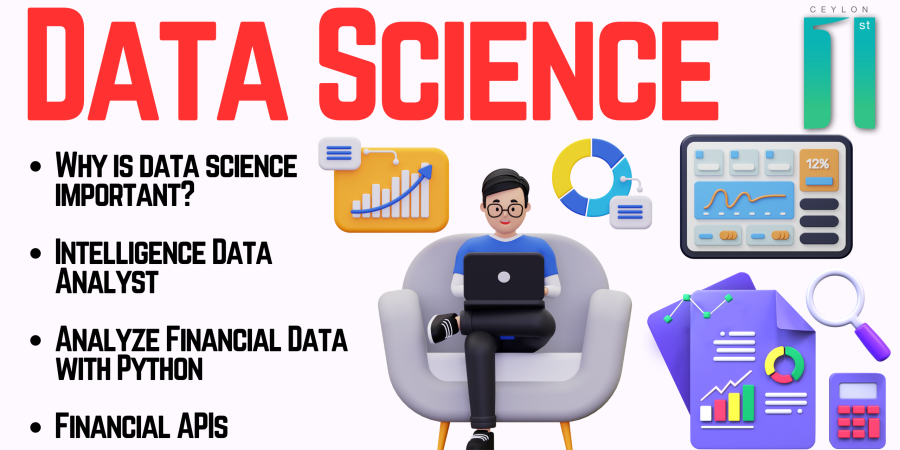Data science involves extracting insights and knowledge from data using a combination of techniques from statistics, machine learning, and domain expertise. It’s a multidisciplinary field that has applications in a wide range of industries. How can I assist you with data science?
Why is data science important?
Data science is important for several reasons, as it plays a critical role in today’s data-driven world:
- Informed Decision-Making: Data science enables organizations to make informed decisions by analyzing large and complex datasets. It helps identify trends, patterns, and correlations that might not be immediately apparent.
- Business Insights: Data science empowers businesses to gain valuable insights into customer behavior, market trends, and competition. This information can drive strategic planning and help businesses stay competitive.
- Predictive Analytics: By using historical data, data scientists can build predictive models that forecast future outcomes. This is invaluable for optimizing processes, reducing risks, and making proactive decisions.
- Personalization: Many companies use data science to create personalized experiences for their customers. Whether it’s personalized product recommendations, targeted marketing campaigns, or tailored user interfaces, data science helps improve user satisfaction.
- Healthcare Advancements: Data science has revolutionized healthcare by enabling the analysis of medical records, genetic data, and patient information. This leads to better disease prediction, treatment optimization, and drug discovery.
- Fraud Detection: Organizations use data science to detect fraudulent activities by identifying unusual patterns in transactions, which helps prevent financial losses.
- Scientific Research: In various scientific fields, data science aids in analyzing experimental results, simulating complex systems, and drawing insights from large datasets.
- Optimising Operations: Data science is used to optimize supply chains, logistics, and manufacturing processes. This can lead to cost savings and improved efficiency.
- Social Impact: Data science has the potential to address societal challenges. For example, it can be used to analyze social trends, predict natural disasters, and allocate resources for humanitarian efforts.
- Digital Transformation: Data science is a key component of digital transformation, helping traditional industries adapt to the digital age by harnessing the power of data.
- Continuous Learning: Data science involves building and refining models iteratively. This process promotes continuous learning and improvement in algorithms and methodologies.
- Uncovering Hidden Insights: Data science techniques often reveal insights that might not be immediately apparent. These insights can lead to innovations and breakthroughs in various fields.
In essence, data science allows organisations to extract meaningful information from data, enabling them to make informed decisions, optimise processes, and innovate. It bridges the gap between raw data and actionable insights, making it a crucial discipline in modern society.
Intelligence Data Analyst
An Intelligence Data Analyst is a professional who specialises in collecting, analysing, and interpreting data to provide insights and support decision-making in intelligence and security-related contexts. This role is crucial in government agencies, military organisations, law enforcement, and other security-focused entities. Intelligence Data Analysts play a pivotal role in ensuring national security, detecting threats, and providing actionable intelligence.
Here are some key responsibilities and skills associated with the role of an Intelligence Data Analyst:
Responsibilities:
- Data Collection: Gather relevant data from various sources, including open-source information, classified documents, surveillance data, and more.
- Data Analysis: Employ advanced analytical techniques to identify patterns, trends, anomalies, and correlations within the collected data.
- Risk Assessment: Evaluate potential threats and risks based on the analyzed data, assessing their severity and potential impact.
- Intelligence Reporting: Create comprehensive and concise reports that communicate findings, insights, and recommendations to decision-makers.
- Collaboration: Collaborate with other intelligence professionals, law enforcement agencies, and government departments to share information and contribute to larger intelligence efforts.
- Technology Utilization: Utilize specialized software tools and technologies for data collection, analysis, visualization, and reporting.
- Threat Identification: Identify emerging threats, vulnerabilities, and potential security breaches through data analysis.
- Predictive Analysis: Develop models that predict future threats or activities based on historical data and trends.
Skills:
- Data Analysis: Proficiency in statistical analysis, data mining, and data manipulation to extract meaningful insights from large and complex datasets.
- Domain Knowledge: Understanding of security protocols, intelligence processes, and threat landscape.
- Critical Thinking: Ability to think critically and analytically to solve complex problems and make informed decisions.
- Communication: Strong written and verbal communication skills for creating reports, presenting findings, and collaborating with team members.
- Technical Skills: Familiarity with data analysis tools, databases, programming languages (such as Python or R), and data visualization tools.
- Attention to Detail: Meticulous attention to detail to ensure accurate analysis and reporting.
- Security Clearance: Often required to obtain and maintain various levels of security clearance, depending on the organization and the sensitivity of the information being handled.
- Ethical and Legal Understanding: Knowledge of ethical considerations and legal constraints related to intelligence analysis and data handling.
Overall, an Intelligence Data Analyst’s role is crucial for identifying threats, predicting potential risks, and providing actionable intelligence that supports the safety and security of a nation or organization.
Financial APIs
Financial APIs (Application Programming Interfaces) are interfaces that allow developers to access and retrieve financial data, such as stock prices, economic indicators, currency exchange rates, and other financial information, from various data providers. These APIs enable developers to integrate real-time or historical financial data into their applications, websites, or analysis workflows without having to manually collect or maintain the data.
Here are some popular financial APIs that offer a wide range of financial data:
- Alpha Vantage: Provides access to a variety of financial and economic data, including stock prices, technical indicators, and exchange rates. Offers both free and premium tiers.
- Yahoo Finance API: Although Yahoo Finance’s public API has been deprecated, various third-party libraries and APIs have been developed to interact with Yahoo Finance data programmatically.
- IEX Cloud: Offers financial and stock market data, including real-time and historical stock prices, company fundamentals, and market news.
- Quandl: A platform for financial, economic, and alternative data. Offers datasets on various topics, including stock prices, commodities, economic indicators, and more.
- FRED API: Provided by the Federal Reserve Bank of St. Louis, this API gives access to economic data, including inflation rates, GDP, interest rates, and more.
- Polygon.io: Offers real-time and historic market data, including stock prices, crypto prices, and forex rates.
- Finage: Provides various financial data, including stock prices, cryptocurrencies, forex, and indices. Offers both free and paid plans.
- Tradier: Focuses on stock market data and trading functionality. Offers a wide range of market data and supports trading through its platform.
- Barchart: Offers financial market data, including stock prices, futures, options, and indices. Provides data in real-time and delayed formats.
- EOD Historical Data: Offers historical stock price and fundamental data, as well as end-of-day data for a wide range of markets.
- Twelve Data: Provides real-time and historical financial data, including stocks, cryptocurrencies, forex, and more.
Before integrating any financial API into your project, consider the following:
- API Documentation: Make sure to thoroughly read the documentation provided by the API provider to understand the endpoints, parameters, and authentication methods.
- Data Accuracy and Reliability: Check the reputation and reliability of the API provider to ensure the data you’re accessing is accurate and up-to-date.
- Rate Limits and Pricing: Be aware of any rate limits on API requests and consider the pricing structure, especially if you plan to use the API extensively.
- Authentication: Understand the authentication mechanisms required to access the API securely.
- Data Usage Policy: Review the terms of use of the API to ensure compliance with data usage policies and licensing.
Keep in mind that the availability and features of financial APIs can change over time. It’s recommended to check the latest information from the API provider’s official website or documentation before making a decision.
CEYLON FIRST



Leave feedback about this